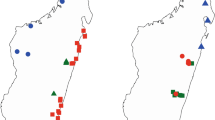Abstract
IN the review of ” The Gramineæ” by Dr. Agnes Arber in NATURE of August 31, 1935, p. 318, Spinifex paradoxus is referred to as one of the dominant species in the Sturt Desert of Australia. S. paradoxus, though widely distributed in sandy patches in the central parts of Australia, cannot be considered a dominant species. The mistake has arisen through the use of the term spinifex for various species of Triodia, which are dominant and very conspicuous features of many parts of Central Australia both on hills and mountain ranges and on sandy areas. Thus the spinifex of the explorers is almost invariably one or other species of Triodia, the other popular name of which is porcupine grass.
This is a preview of subscription content, access via your institution
Access options
Subscribe to this journal
Receive 51 print issues and online access
$199.00 per year
only $3.90 per issue
Buy this article
- Purchase on Springer Link
- Instant access to full article PDF
Prices may be subject to local taxes which are calculated during checkout
Similar content being viewed by others
Author information
Authors and Affiliations
Rights and permissions
About this article
Cite this article
CLELAND, J. Spinifex in Australia. Nature 137, 738–739 (1936). https://doi.org/10.1038/137738a0
Published:
Issue Date:
DOI: https://doi.org/10.1038/137738a0
Comments
By submitting a comment you agree to abide by our Terms and Community Guidelines. If you find something abusive or that does not comply with our terms or guidelines please flag it as inappropriate.



